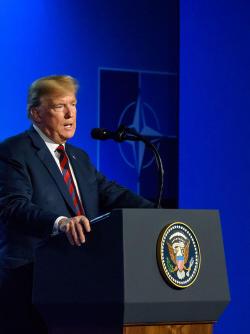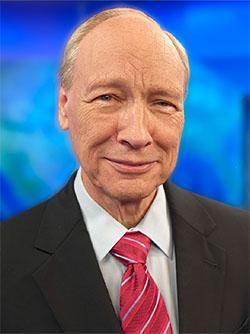The Coming Clash of Civilizations
Western nations have dominated much of the world for nearly five centuries. During this era, European nations—and later, the United States—gained power and spread the influence of Western civilization over much of the globe. China and Japan were forcibly opened to European and American trade. Africa, India, and much of Asia were overwhelmed and carved up by Western powers. The Russian Empire fell to the communists and then lost the Cold War to the West.
Yet, in recent decades, the pages of history have begun to turn, and we have entered a new era. Scholars note that in the twentieth century, “the expansion of the West” came to an end and “the revolt against the West” began, as other civilizations re-emerged on the world stage (The Clash of Civilizations and the Remaking of World Order, Samuel P. Huntington, p. 53). Today, we face another major turning point in history—“one of those rare moments in history when the political and economic axis of the world is shifting”—away from the West and toward the East (The Dawn of Eurasia, Bruno Maçães, p. 1).
But how will this major shift impact the world, as civilizations in the East emerge to challenge once-dominant Western powers? While secular analysts try to discern the geopolitical future, few today realize that key events in that future were foretold long ago in ancient Bible prophecies. Even fewer recognize the prophetic significance of current events that are beginning to match events predicted to occur before the return of Jesus Christ. Today, many have also forgotten that God guides the course of history, and that He raises up nations and brings them down, according to His purpose (Job 12:23; Daniel 2:21; 4:17).
End-Time Bible Prophecies
Around 539bc, while he was among the Jewish captives in Babylon, the Hebrew prophet Daniel was given a detailed dream about the distant future. In Daniel 11:40–45, he records that “At the time of the end” a king of the South (an Arab-Muslim force) will push at or attack a king of the North (an end-time European power) which will then invade the Middle East and occupy Jerusalem (see previous articles in this series, “Europe’s Final Revival” and “Islam’s Last Jihad”). Daniel also records in verse 44, “But news from the east and the north shall trouble him; therefore he shall go out with great fury to destroy and annihilate many.” Today, Russia lies to the north of Jerusalem and Iraq, Iran, and China lie to the east. Other prophecies, in Revelation 9, indicate this European power will launch a five-month offensive toward the north and east, precipitating a major military response that will kill one-third of mankind. From the perspective of Bible prophecy, it is no coincidence that an aggressive Russia and a more assertive China have re-emerged while the power and influence of the West has declined.
Return of Russia
The current leader of Russia is Vladimir Putin, a dedicated nationalist and former KGB operative with strong Orthodox beliefs. Disillusioned by the collapse of the U.S.S.R. and the failure of Marxism, his goal has been to unite a fractured country, and—as a modern Peter the Great—restore the national pride of Russia. He reminds Russians that they successfully repulsed invasions from the West launched by Napoleon and Nazi Germany. Under his watch, the Orthodox Church has replaced the communist party as the foundation of Russian society. As Samuel Huntington observed, “For peoples seeking identity and reinventing ethnicity, enemies are essential” (Huntington, p. 20). For many, such as Putin, America and other nations of Western civilization are ready candidates for that role.
As the leader of one of the core nations of Orthodox civilization, Putin is concerned about the spread of NATO into eastern Europe and about China’s economic and cultural advances into western Eurasia. His alternative plan is to create a zone of Russian influence, the Eurasian Economic Union (EEU), that will counter the pull of the European Union and the influence of China’s New Silk Road Initiative—even though China and Russia share a communist past and a historic alienation from Western values. Considering Putin’s KGB past, it is no surprise that as his power has grown, Russia has seen increased authoritarianism and the brutal suppression of dissent. The recent annexation of Crimea and eastern Ukraine (both of which are primarily Russian and Orthodox) provides insight into how a more aggressive Russia will behave in the future.
China Awakens
Eurasia—the world’s largest landmass and the location of a vast portion of the world’s population and resources—lies east of Jerusalem. This region contains several of the world’s largest economies. The most formidable and dynamic country in Eurasia is China. China’s current leader, President Xi Jinping, seeks to restore its greatness after more than a century of humiliation at the hands of Western powers. Like Russia, the Chinese government also needs an enemy “to bolster its appeal to Chinese nationalism and legitimate its power”—a role filled by America and the West (Huntington, p. 224). Under President Xi’s guidance, China’s goal is to assume its historic role as the leader in Asia and to become a major player on the world stage. To this end, he is promoting a Belt and Road Initiative that devotes immense resources to the building of roads, railways, harbors, power plants and pipelines across Asia and around the world. He seeks to enhance trade and open markets for Chinese labor and products, and to give China access to resources—oil, gas, coal, and minerals—that its expanding economy desperately needs.
However, President Xi’s aggressive leadership has raised concerns among China’s neighbors and other world powers. Massive loans to less-developed nations will make those countries more amenable to supporting China’s interests. Some fear its developing infrastructure and transportation projects could be used to move Chinese troops. Like Putin, Xi has shown a willingness to crack down hard on internal dissent, and he has pledged to protect his nation’s interests and citizens living abroad. China recently established a military base on the Red Sea in Djibouti to protect Chinese interests. While some see China’s military buildup and activities in the South China Sea as provocative, China views these actions as defensive—meant to ensure it is never again threatened by foreign powers. China and Russia have conducted joint military exercises, and neither has any intention of being under the thumb of Western nations. Their goal is to overtake and replace the West as they work to establish a new political order more amenable to their own interests (Maçães, pp. 121–122).
Today, as we see the age of Western dominance coming to an end and the world’s center of gravity shifting to the East, knowledgeable observers warn that “the rise of China is the potential source of a big intercivilizational war of core states” (Huntington, p. 209). While some nations will try to prevent or contain this shift, other nations will want to join forces with the rising civilizations. In his book China’s Asian Dream, economic analyst Tom Miller reminds readers that Napoleon once described China as a sleeping lion that will “shake the world” when it awakes. In the coming clash of civilizations—long predicted in Bible prophecy—the roar of that lion and its allies will indeed be heard around the world.






